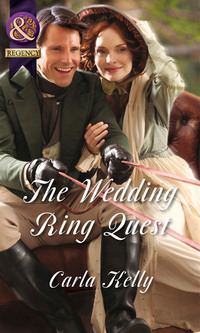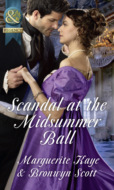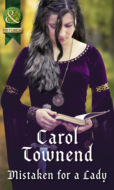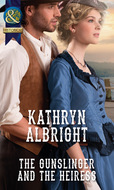Kitap dosya olarak indirilemez ancak uygulamamız üzerinden veya online olarak web sitemizden okunabilir.
Kitabı oku: «The Wedding Ring Quest»
‘What would you like in a husband?’
A mere twenty-four hours ago such a question would have amazed her with its impertinence. As she sat there considering his question she discovered that she had already taken the measure of this man. Captain Ross Rennie was as transparent as water—a capable man with no inclination to dither or waste his time or anyone else’s. He had spent a lifetime in duty to his country so intense and harsh that it did not let go, even in a snowy village in Yorkshire. She knew it was not a casual question because he was not a casual man.
‘I’ve never really thought about it,’ she told him honestly.
He didn’t believe her. ‘Come, come, Miss Rennie, you’re a fine-appearing Scottish lass!’
‘Thank you kindly,’ she said with a smile. ’I also live with my aunt and uncle, who have no particular obligation to see me wed. They’re not the sort of people who exert themselves.’ She thought about the matter. ‘And perhaps I have not exerted myself overmuch either.’
She didn’t say that in any attempt for pity, and he seemed to know it. With a smile, he touched her hand…a light touch.
Praise for award-winning author Carla Kelly:
‘A powerful and wonderfully perceptive author.’
—New York Times bestselling author Mary Jo Putney
‘It is always a joy to read a Carla Kelly love story. Always original, always superb, Ms Kelly’s work is a timeless delight for discerning readers.’
—RT Book Reviews
‘Kelly has the rare ability to create realistic yet sympathetic characters that linger in the mind. One of the most respected…Regency writers.’
—Library Journal
‘…an emotional, uplifting, delightful romance about two wounded souls who find love and comfort in each other.’
—RT Book Reviews on HER HESITANT HEART
‘Taking her impetus from Robinson Crusoe and the film Castaway, Kelly crafts the story of a shipwreck survivor readjusting to civilisation… Kelly presents a clear portrait of the mores and prejudices of the era, and demonstrates how to navigate through society’s labyrinth with intelligent, sharp repartee. This alone is worth the price of the book.’ —RT Book Reviews on BEAU CRUSOE
The Wedding Ring
Quest
Carla Kelly

MILLS & BOON
Before you start reading, why not sign up?
Thank you for downloading this Mills & Boon book. If you want to hear about exclusive discounts, special offers and competitions, sign up to our email newsletter today!
Or simply visit
Mills & Boon emails are completely free to receive and you can unsubscribe at any time via the link in any email we send you.
DEDICATION
To my cousins and to all men and women wounded, in some way, by war.
My Bonnie Mary
The trumpets sound, the banners fly,
The glittering spears are ranked ready;
The shouts o’ war are heard afar,
The battle closes thick and bloody;
But it’s no the roar o’ sea or shore
Wad mak me langer wish to tarry;
Nor shout o’ war that’s heard afar—
It’s leaving thee, my bonnie Mary!
Robert Burns
CARLA KELLY started writing Regency romances because of her interest in the Napoleonic Wars, and enjoys writing about warfare at sea and the ordinary people of the British Isles rather than lords and ladies. In her spare time she reads British crime fiction and history—particularly the US Indian Wars. Carla lives in Utah, USA, and is a former park ranger, and double RITA® Award and Spur Award winner. She has five children and four grandchildren.
Novels by the same author:
BEAU CRUSOE
CHRISTMAS PROMISE
(part of Regency Christmas Gifts anthology) MARRYING THE CAPTAIN* THE SURGEON’S LADY* MARRYING THE ROYAL MARINE* MARRIAGE OF MERCY THE ADMIRAL’S PENNILESS BRIDE HER HESITANT HEART
* linked by character
Did you know that some of these novels are also available as eBooks? Visit www.millsandboon.co.uk
Contents
Chapter One
Chapter Two
Chapter Three
Chapter Four
Chapter Five
Chapter Six
Chapter Seven
Chapter Eight
Chapter Nine
Chapter Ten
Chapter Eleven
Chapter Twelve
Chapter Thirteen
Chapter Fourteen
Chapter Fifteen
Chapter Sixteen
Chapter Seventeen
Chapter Eighteen
Chapter Nineteen
Chapter Twenty
Chapter Twenty-One
Chapter Twenty-Two
Chapter Twenty-Three
Chapter Twenty-Four
Chapter Twenty-Five
Chapter Twenty-Six
Chapter One
This was no ordinary return to Plymouth; Captain Ross Rennie felt it in his bones. A frigate captain much wiser than he—dead now, like so many friends—had described it best during one of those chats on the far side of the world when another frigate pulled alongside to visit and hand off mail.
In the course of their conversation over beef too long in brine and green water, they described recent fights with the French or Spanish, depending on where national allegiance had swung in an endless war. The long-defunct captain had looked Ross square in the eye and said, ‘Sometimes a victory is only a hair’s breadth better than a defeat.’
A young captain at the time, Ross had nodded, wondering later what the devil the man meant. As his thirty-six-gun frigate Abukir sailed into Plymouth on a rainy day, Ross felt that hollow, sinking feeling of defeat, when he should have been over the moon with joy. The emotion had been growing since his ship had been ordered to join the convoy escorting Napoleon and his entourage to Elba after his banishment there in 1814 by the Allies. A time or two during the short voyage from France, he had stood on his own quarterdeck and observed Bonaparte on HMS Undaunted, Captain Tom Ussher’s frigate.
Ross almost hated himself for finding the man so fascinating, but the exiled emperor seemed to demand attention. Ross noticed other telescopes trained on Napoleon.
The longer he watched Napoleon, the greater grew his personal sense of disquiet, the greater his sense of defeat. Normally a sanguine fellow, Ross felt himself grow grim about the mouth. He’s so short and stout, Ross thought. So ordinary. He took his observation into dangerous territory then, the worst place any officer could take himself. How in the world did this man rule my life for twenty-four years? Ross found himself asking.
For he had. For more than a generation, Ross had sailed where this tyrant intended, fought French and Spanish ships, logged miserable hours twice in prisons, lost a leg, found a true love and lost her, too. Supposedly he was in the service of poor King George III, but Ross knew what all officers and men in the Royal Navy knew—had there been no Napoleon, there would have been no war. He would probably never have gone to sea in a fighting ship. Without that stout little man, Ross Rennie would probably have conned nothing more dramatic than a merchant vessel.
‘You ruined my life,’ he murmured one lazy afternoon as they approached the island of Elba, some twelve mere kilometres from Tuscany. The only man within earshot was the helmsman and he was used to hearing his captain mutter.
But because he was sanguine and normally rational, Ross had to reason with himself. Was this true? The war was over, so he did something unheard of: he leaned his elbows on the ship’s rail. He looked up when he heard the sails luff, and laughed, knowing his sudden lapse of ship’s discipline had caused the helmsman to stare and lose his concentration.
Embarrassed, Ross straightened up and administered the patented Rennie stare to his helmsman, who quickly corrected his error. Not one to leave a good seaman flustered, Ross nodded to the man. ‘I’m going to do it again, Carter,’ he said and returned to his casual pose. The Abukir continued on course.
True to his nature, Ross made a mental list of pros and cons. Aye, he had spent his life on board fighting ships, but that had likely proved more interesting than coasting around England and Scotland, and maybe to far-off America with a cargo of dried herring, shoes or corsets.
Had the navy not taken him to exotic Portugal, he would never have met Inez Veimira, whose love still made him smile. And he most certainly would never have fathered the boy who waited for him now in Plymouth, a boy with hair as dark as his own, but curly, with full lips instead of Scottish ones and an olive tint to his skin. Nathan’s brown eyes were his mother’s alone. Their beauty had given Ross pause to miss Inez Veimira, until his natural optimism turned his regrets into those little blessings a healthy son furnished.
The loss of his leg at Trafalgar in 1805 had not been without a little good fortune, as Ross chose to see it. The ship’s surgeon had only needed to take his mangled leg off five inches below the knee. Difficult as it was, and too long his stay in the Plymouth hospital, the surgeon had assured Ross that an officer who still had his knee could command a quarterdeck and expect advancement. And so it had proved.
And there was this, probably his greatest blessing: Napoleon’s stupid war had turned Ross Rennie into a leader of men, a rock-solid fellow whose sensible decisions made the Abukir a good home for men like him. The helmsman was a case in point. Once caught in Captain Rennie’s firm but benevolent web, men tended to stay there through the years, knowing they were in good hands.
Seen from this light, Ross decided perhaps the war that had spanned all seven seas and ushered out one century and welcomed another had not been a total failure. By the time the Undaunted and her escort dropped anchor in charming Elba’s harbour, Ross’s heart was calm again. True, the war was over with Napoleon and, as a valued post captain, Ross knew the Royal Navy would find something for him to do. As a father, he wanted to sail to Plymouth and spend some time with his son. It remained to be seen whether he had the clout to manage both, but he thought he did.
As it turned out, he was right on both counts. True, that immediate return to base in Plymouth had dragged out until November as the Abukir and others like her continued to patrol the Channel. While people in England had devoted much time rejoicing that the Beast was on Elba, the Royal Navy took a more cautious view and continued to patrol waters at least less hostile.
Hoys and lighters still made their way back and forth to victual ships like Ross’s long at sea and they conveyed letters. Many a night after mess Ross read and re-read his letters from Nathan and hoped his son did the same thing with the missives he sent, accompanied by those exotic things only a Navy man could come across: oranges and lemons, a prayer rug from North Africa and Gouda cheese from the Low Countries, specifically for Maudie Pritchert, who had the raising of his boy.
If only Ben Pritchert, sailing master, had lived to see Napoleon on Elba. On that final voyage from the Channel to Plymouth, he missed Ben even more than usual. It had been his sailing master, a father in his own right, who had suggested Ross take his infant son from Portugal to his own wife in Plymouth. In 1804, the year of Nathan’s birth, Oporto had suffered one of those earthquakes the coast was prone to. It was nothing as severe as the 1755 disaster, but the port merchant’s home had been demolished, along with all its inhabitants except a week-old baby covered by his mother’s body.
So the nuns at the nearby convent had told Ross, as he had shouted Inez’s name over and over in the ruins, when he came into port a week after the quake. He knew she had borne him a child during his last voyage of seven months’ duration to the Baltic. More than that, he did not know. The unexpected voyage had scuttled elaborate wedding plans, beyond quick nuptials, because their child was already underway. But that was the Royal Navy, which took no interest in the lives of its men. The good sisters had taken over the care of his little morsel and laid his son in his arms when tears still streamed down his face.
They had willingly fostered his child, named Nathan Thomas Fergusson Rennie and christened in the Holy Catholic faith because that was what the nuns did. Three months later when HMS Fearless was posted from Oporto to Plymouth for extensive repair, the nuns had returned Nathan to him, along with a goat.
He had known there would be a seaman or two who probably knew exactly what to do with a milking goat and they had not failed him. What had touched him to his soul was the way every man on board took an interest in his son. There had been no lack of volunteers willing to walk back and forth with a colicky baby, after Ross was ready to drop from exhaustion. His son’s first English lullabies were sea ditties better left shipboard.
Maudie Pritchert had received the baby with open arms. Two years later, she wore widow’s weeds. It was no wonder that as his prize money collected ashore, Ross had purchased a better house for the Widow Pritchert and her four children, plus his son. He paid her a handsome income to raise the boy he only saw at intervals. Now that the war was over and he was sailing home, Ross knew he would continue that stipend throughout that kind woman’s career on earth, for she had saved his son’s life.
His debt was far greater. After Ross had learned to stump around on a peg-leg and manage a quarterdeck again, Ben Pritchert saved his life during a skirmish not even worthy of inclusion in the Naval Chronicle. They had been coasting off France when a larger French frigate came out to play. In the middle of hot action, Ross lost his balance on his rolling deck. His sailing master rushed to steady him and took the deadly splinter in the back that would have cut Ross in two. He would owe both Pritcherts until he died.
* * *
Sailing into Plymouth harbour this time was more bittersweet than he would have imagined. For nostalgia’s sake, Ross conned the Abukir, savouring the moment. He glanced towards the houses that marched up the gentle slopes away from the town centre, wondering if Nathan was watching. During his last visit a year ago, he had given his son a telescope. Maybe in a few years, he would give him a sextant. Maudie said the lad had an aptitude for mathematics.
On the advice of the overworked harbour master—so many ships returning—he dropped anchor, then looked around at the disorderly order on the Abukir’s decks. His orders said the ship was to be refitted and refurbished. Two months and he would sail again—where, he had no idea. Two months of shore leave was one month and three weeks longer than any break he had enjoyed since the Peace of Amiens in 1802.
With a reluctance that surprised him, Ross turned the ship over to his number one, assuring him he would return in a day or two to settle out any complications with dry docks. He knew his officers yearned to leave the Abukir as much as he did. The men would go home, too, those who had homes. Others would hang around the docks, spend their money and be glad to see him in two months, if they hadn’t been pressed into another vessel short of crew.
His chief bosun’s mate insisted on piping him over the side himself, which was flattery, indeed. Because all eyes on deck were on him, Ross did his best to descend the ropes with dignity, never easy with a leg and a half. When he was safely settled in his launch for the pull to shore, he raised his hat and saluted his crew. It’s only two months, he reminded himself as he felt unfamiliar tears gather behind his eyelids.
Although there were hackneys waiting to take him anywhere in Plymouth, Ross waved them off. He wanted to walk from the harbour to Maudie Pritchert’s house. He knew his sorely tried leg would start to ache before he got there, but he needed the opportunity to shake off his sea legs. In parts of England far from the coast, the watch would probably be summoned to deal with men lurching and rolling down the street. Not Plymouth, a Navy town that understood what it meant for its men to remind themselves how to walk on a flat surface that didn’t pitch and yaw.
A peg-leg presented its own challenges, but he arrived in good time at the base of Flora Street, with its pretty pastel houses. As always, he stood there a long moment, wondering how much his boy had changed. Nathan was ten years old now. No one knew what his actual birth date was, because there hadn’t been time to register anything before the earth moved in Oporto. A few visits back, the two of them had picked June 7th, an unexpected compliment, because that was Ross’s birthday.
When he had asked his son why he wanted to share a birthday, Nathan’s answer confirmed for all time that while it was possible to take a Scot far from the land of his ancestors, the economy remained. ‘Simple, Da,’ his son had told him. ‘It’s a tidy thing to do. We’ll have cake but once a year, but we’ll have twice as much.’
It was the perfect answer. Nathan, whose mother had been a heavy-lidded, sloe-eyed daughter of Portugal and deeply fond of cake, was a fitting combination of Dumfries and Oporto.
‘Twice as much,’ Ross agreed.
With the war over, he had plans this time, since a prodigal amount of leave stretched ahead that would take them through Christmas. The two of them were bound for Dumfries, where Ross’s older sister lived with her surgeon husband. He hadn’t seen her in years, but that was nothing because he had always been a prodigious correspondent and so was Alice Mae Gordon. She had promised them a good visit and hinted that she knew of a piece of property in need of a landlord in nearby Kirkbean. ‘In sight of open water,’ Alice had written, to further entice him.
He stood a moment more, wondering at the half dread he always felt, hoping his son hadn’t changed too much since the last visit, but well aware that children grow. Will he remember me? he always asked himself. If he passed me on the street, would I know him?
Ross took the customary deep breath and continued up Flora Street, his eyes on a yellow house, where flowers still fought the good fight against late autumn. He knew that in Scotland, the flowers had long surrendered to winter, but this was lovely Devon.
He walked slower because his leg pained him and because there was always that moment when he wondered who would greet him. For the first time since Inez’s death, for the first time in the terrifying and fraught years since, he wanted a wife to greet him, too. It was a heady thought and he entertained it cautiously, thinking of all the times he had assured his officers and wardroom confidants that he would find another wife when the war ended. Maybe the time was now.
Ross stopped outside Number Six Flora Street and looked up at the second-storey window that he knew was Nathan’s room. His heart skipped a little beat as his dear son looked down on him. The boy disappeared from the window and Ross watched the front door. It slammed open and his son hurtled outside and into his open arms.
Ross was home from the sea.
Chapter Two
For someone without much choice in the matter, Mary Rennie had finally had her fill of relatives. Maybe it was the season; more likely it was her Cousin Dina. Maybe it was simply time for an epiphany.
Her father, long dead, had been a clergyman in the Church of Scotland. He knew a thing or two about epiphanies, especially the January 6th one involving the Christ and the Magi. Mary had a different epiphany in mind, the one where you realise something startling that probably should have happened years ago.
She blamed it on her propensity to be a late bloomer, but there she was, twenty-seven years old and tired of relatives, especially Dina. And so she told Mrs Morison, her only confidante, when they were peeling potatoes in the kitchen.
Mrs Morison was cook and not generally the peeler of potatoes, except that Betty, the scullery maid, had a toothache and Mrs Morison never seemed to mind a good chat with Mary, especially over tea and biscuits on a raw October afternoon in Edinburgh. Dinner was a long way off, and there was time to peel and chat and drink tea.
‘Oh, my dearie, Dina is engaged to that prosy foreign fellow and she is blue-devilled,’ the cook announced, after heaving herself up to retrieve more biscuits. ‘Never trust a man from over the border.’
Mary smiled to herself. She had never been over the border, herself, but Papa had assured her years ago that Englishmen were only doing the best they could and Presbyterians could be charitable.
‘Aye, Mrs M.,’ she said, applying herself more diligently to the potatoes. She stuck the potato on the end of her knife and wagged it at the cook. ‘But why must I suffer because she is engaged? She whines and carries on, and I don’t know why. Isn’t a bride-to-be supposed to be cheerful?’
Mrs Morison peered at her over the top of her spectacles. She lowered her voice and leaned closer. ‘I think she is already afraid of her wedding night.’
‘That’s months away,’ Mary whispered back. ‘Besides, I would think that once you find a man to love, that wouldn’t be a consideration.’ She leaned back as another epiphany followed hard on the heels of the first. ‘Ah. Maybe she doesn’t really love Mr Page?’
Mrs Morison gave her a sage look and shook her head, tut-tutting as she peeled.
‘Then why...?’ Mary put down her knife. ‘Oh, dear. Is she afraid she’ll never get another offer?’
She considered the matter. It was probably true. Dina Rennie wasn’t high on good looks. Mary couldn’t help but smile, remembering the time last summer when one of the street sweepers neighed when Dina passed by. But it was wicked to joke about Dina’s long face, or so Papa would have told her. Mrs Morison was saying something, so she glanced up.
‘You have the family looks—all of them, I think,’ Mrs Morison was saying. She shook her head and returned her attention to the root vegetable in her lap whose skin was starting to turn a little brown from lack of attention.
Maybe, but none of the money, Mary thought, knowing that the cook was too kind to mention it. Not that any of the Rennies were particularly attractive, she knew, but Papa had married a Maxwell from Spring Hill and there was the difference: lips a little fuller than the Scottish norm, a trim and tidy figure, deep auburn hair—none of the Rennie carrot hue—and snapping green eyes. Mary felt the freckles were a discount, but Mama always said they were a happy sprinkle across her nose and no detriment.
‘I wish I had money,’ she admitted, because she knew Mrs Morison was no tattletale. ‘I’m twenty-seven and something should have happened to me before now.’
* * *
When she lay in bed that night, Mary considered her age and virgin state. She smiled in the dark, remembering how carefully her Aunt Martha had skirted around matters of procreation, how it was accomplished and women’s subservient role. Since they were much the same age, Dina had been party to the same conversation, her eyes wide, her mouth a perfect O. Mary had listened to Auntie’s red-faced circumlocutions and kept her own counsel. Before Mama had died when Mary was fifteen, she had been more plain spoken.
There had been a quiet admonition, though, a coda to the conversation about men and women and What They Did. ‘Remember this, my darling daughter: some day there will be a man who will meet all your requirements. Wait for him, because he will be worth it,’ Mama had advised, making no effort to disguise that lurking Maxwell twinkle in her eyes.
Too bad Mama had died two weeks later, killed by the wasting disease. Papa had never enjoyed good health, so he took the opportunity six months later to join his wife in a better place than a Montrose rectory where the chimneys drew badly and no one was ever warm.
‘And so I came to Edinburgh,’ Mary informed the ceiling, that night of her epiphany. ‘They are good to me here. I lack for nothing, but I have become part of the furniture.’
* * *
The matter was on her mind a week later after All Saints Day. Although Aunt Martha never would have admitted it, she was a superstitious woman. She never went below stairs with her Christmas cake recipe on All Hallows Eve, when ghosts walked. Mary and Mrs Morison were far too kind to ever tell the good woman that even ghosts weren’t interested in the Rennie Christmas cake.
It always puzzled Mary that Auntie kept the fruit-cake recipe squirrelled away in her bedchamber, as though it were a great treasure and liable to be stolen in so unprotected a place as the kitchen. Mary was the last person who would ever have told Auntie that Mrs Morison had long ago copied the recipe and kept it among her own well-used recipes in that kitchen so open to thievery and who knew what else.
‘It is time,’ Aunt Martha announced and handed over the much-creased paper with all the ceremony a Scot ever indulged in. ‘One dozen this year, if you please.’
It was always one dozen, four of which remained at home to be consumed around Christmas, after a six-week curing. The other eight were sent to friends and family.
Mrs Morison nodded and accepted the recipe, promising to take it to bed with her and put it under her pillow, until it was safe again upstairs with Mrs Rennie. ‘Lord love her,’ the cook had murmured after her employer went upstairs.
The only thing that saved the cakes from rejection was the thick layer of marchpane Mrs Morison applied to two of the cakes that remained at the house on Wapping Street. Mrs Rennie had looked more thin-lipped than usual the first time Mrs Morison applied the coating, but Uncle Samuel had nodded his approval, so that was that.
He had approved even more of the other two cakes remaining hearthside. In her desperation to make the cakes less dry—perhaps she had had her own epiphany—Mrs Morison drowned the other two cakes in rum. True, the recipe did include rum, but only a Scottish amount. ‘I fear my hand slipped,’ Mrs Morison had fibbed to her employer, the first time she served that particular rendition.
Uncle Sam had done more than nod his approval. He held out his plate for another slice. ‘And make it thicker,’ he added, his voice only slightly slurred.
So rum it was, and marchpane, for the Wapping Street cakes. The cakes to be mailed had rum, but not quite as much.
* * *
Making the cakes was a week-long event, with Monday and Tuesday taken up with endless chopping of glacé cherries, candied peel, sultanas and currants. Almonds generally were halved. Mrs Morison baked the homebound cakes on Wednesday, giving them ample time to cure or ferment in a dark space. The cook had been gradually adding more and more rum to the marchpane cakes, as well, which wouldn’t get their mantle of thick icing until closer to Christmas.
For the entire week, Mary had joined Mrs Morison and the scullery maid, now minus a tooth, in the ordeal of Christmas cakes. Dina hadn’t the patience for all the chopping and dicing, which Mary found a relief. She loved her cousin, but a few hours of non-stop talking gave Mary a headache. Dina’s conversation had taken a decidedly querulous turn, now that she was engaged, and was even whinier than usual.
Perhaps I am envious, Mary thought, as she diced candied cherries and candied peel to Mrs Morison’s exacting specifications. I would like a husband because that would mean children and I do enjoy wee ones.
Thursday had seen the construction of four more cakes, also baked, doused and sent to a dark corner to rest and lick their wounds.
The last four of the yearly cakes were in process on Friday, when Dina stormed into the kitchen and upset everything. Mary had finished cracking the eggs into the soft butter and caster sugar. As she stirred and Mrs Morison gradually added flour, Dina strode around the kitchen, fire in her eyes. She was waving a small object. Mary wished her cousin would go away. Mixing the batter was her favorite part of the whole process. She wanted to enjoy, without drama, the smoothness of the batter and the buttery fragrance as it competed with vanilla bean.
But Dina needed an audience. With a pang, Mary realised she had for too long unwillingly furnished that audience. I am too complacent, she told herself, as Dina wound herself up like a top. What would she do if I walked away?
Mary was fated never to know. By now, Dina had tears in her eyes.
‘I ask you, has there ever been a stingier husband-to-be than Algernon Page?’ she fumed.
‘What is it, my dear?’ Mary said at last, because it was required of her. She continued swiping down the sugar crystals in her mixing bowl, thinking Dina might get the hint.
Not Dina. Her cousin stuck a small ring in Mary’s face. ‘That...that cheapskate sent me this paltry bauble for Christmas! He thinks I’m going to wear it.’
Mary looked closer. It was a small ring, very thin gold with what looked like little scratches. She squinted. No, they were leaves or twigs. ‘Hmmm. Perhaps it has some family meaning,’ she ventured.
‘Only that the whole family consists of clutch purses,’ Dina shot back. ‘Would you wear such a thing?’
I would if I loved my future husband, Mary thought, even though she knew she would never say it. She decided Dina wanted some comment, so she mumbled something that seemed to fill the silence.
‘I won’t wear it,’ Dina said, making her long face suddenly longer. She stared at the cake batter, as though daring it to contradict her. Her eyes narrowed and she tossed the spurned ring into the batter. ‘There! Send it to someone.’








